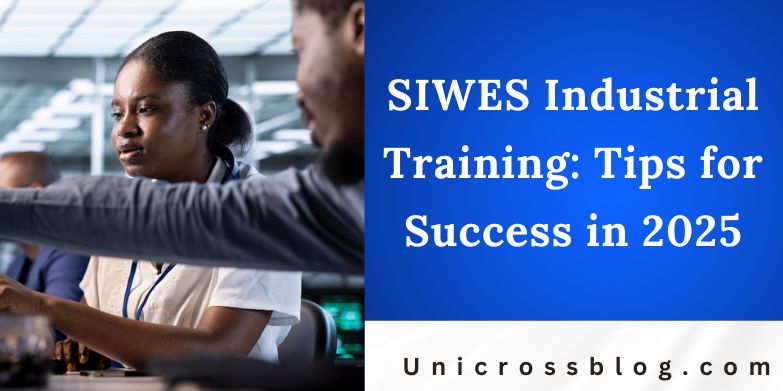The Students Industrial Work Experience Scheme (SIWES) is a vital program for tertiary institution students in Nigeria, designed to bridge the gap between theoretical knowledge and practical industry experience. As a mandatory requirement for many academic programs, SIWES equips students with hands-on skills, workplace exposure, and professional insights critical for career development. In 2025, with industries evolving rapidly due to technological advancements and shifting workplace dynamics, excelling in your SIWES placement requires strategic preparation and adaptability.
This guide provides comprehensive tips to ensure you maximize your SIWES experience, from preparation to execution, helping you stand out and gain valuable skills for your future career.

Preparing for SIWES in 2025
1. Research and Choose the Right Placement
Before starting your SIWES, invest time in researching organizations that align with your field of study and career goals. Industries such as technology, engineering, healthcare, and agriculture offer diverse opportunities. Identify companies known for structured training programs and a strong reputation in your discipline. Reach out to your institution’s SIWES coordinator for a list of approved organizations, and consider factors like proximity, company size, and relevance to your career aspirations when making your choice.
2. Update Your Resume and Cover Letter
A professional resume and cover letter are essential for securing a placement. Tailor your resume to highlight relevant coursework, projects, and skills that align with the industry. Keep it concise, ideally one page, and focus on achievements that demonstrate your potential. Your cover letter should express enthusiasm for the opportunity, explain why you are a good fit, and show knowledge of the company’s operations. Proofread both documents carefully to avoid errors, as they are your first impression to potential employers.
3. Develop Relevant Skills
Before your training begins, enhance your technical and soft skills to prepare for workplace demands. For instance, if you’re in IT, familiarize yourself with programming languages like Python or JavaScript. For engineering students, proficiency in tools like AutoCAD or MATLAB can be beneficial. Soft skills such as communication, teamwork, and time management are equally important. Online platforms offer free or affordable courses to build these skills, ensuring you’re ready to contribute effectively during your placement.
4. Understand SIWES Requirements
Each institution has specific SIWES guidelines, including duration, report formats, and assessment criteria. Familiarize yourself with these requirements early to avoid last-minute challenges. Obtain the SIWES logbook from your institution and study the reporting structure. Knowing what is expected regarding weekly reports, presentations, or evaluations will help you stay organized and meet deadlines.
Excelling During Your SIWES Placement
1. Adopt a Professional Attitude
Professionalism is key to making a positive impression. Arrive on time, dress appropriately for the workplace, and maintain a respectful demeanor. Show initiative by asking questions, seeking feedback, and volunteering for tasks. A positive attitude demonstrates your commitment and can lead to stronger relationships with supervisors and colleagues.
2. Build Relationships and Network
Your SIWES placement is an opportunity to connect with industry professionals. Engage with your supervisors, colleagues, and fellow interns to build a professional network. Be approachable, listen actively, and show genuine interest in others’ work. These connections can provide mentorship, references, or even job opportunities in the future. Attend company events or meetings if permitted, as they offer additional networking opportunities.
3. Document Your Experience Thoroughly
Accurate documentation is crucial for SIWES success. Use your logbook to record daily tasks, skills learned, and challenges encountered. Be detailed but concise, as these entries will form the basis of your final report. Take notes during training sessions or meetings to capture key insights. Regularly review your logbook to ensure it aligns with your institution’s requirements and reflects your contributions accurately.
4. Seek Learning Opportunities
Approach your placement as a learning experience. Ask for exposure to different departments or projects to gain a broader understanding of the industry. If you’re in a tech company, for example, request to observe software development or testing processes. If in manufacturing, learn about quality control or production workflows. Proactively seeking knowledge demonstrates curiosity and can enhance your skill set.
5. Manage Your Time Effectively
Balancing workplace tasks with SIWES documentation requires strong time management. Create a schedule to allocate time for work, logbook updates, and personal study. Prioritize tasks based on urgency and importance, and avoid procrastination when completing reports or assignments. Effective time management ensures you meet deadlines without compromising the quality of your work.
Overcoming Common Challenges
1. Adapting to Workplace Culture
Workplace environments may differ significantly from academic settings. You may encounter strict hierarchies, tight deadlines, or unfamiliar technologies. To adapt, observe how employees interact, follow company policies, and ask for clarification when needed. Be patient with yourself as you adjust, and seek guidance from supervisors if you feel overwhelmed.
2. Handling Limited Supervision
In some placements, supervisors may be too busy to provide constant guidance. Take initiative by setting personal goals, asking for tasks, or proposing small projects that align with the company’s objectives. Demonstrating independence while staying within your role’s scope can earn you respect and show your ability to work autonomously.
3. Dealing with Lack of Resources
Some organizations may lack the tools or infrastructure you’re accustomed to. Be resourceful by leveraging available materials, asking for alternatives, or suggesting creative solutions. For example, if software is outdated, focus on mastering its functionality while suggesting improvements tactfully. Adaptability in resource-scarce environments is a valuable skill employers appreciate.
Post-SIWES Steps for Success
1. Compile a Comprehensive Report
Your final SIWES report is a critical component of the program. Use your logbook entries to draft a detailed report summarizing your activities, skills acquired, and contributions to the organization. Follow your institution’s format, typically including an introduction, company overview, work experience, challenges, and recommendations. Use clear, professional language and support your points with examples. Submit the report on time to avoid penalties.
2. Reflect on Your Experience
Take time to evaluate your SIWES experience. Identify the skills you gained, challenges you overcame, and areas for improvement. Reflecting helps you articulate your growth in future job interviews and prepares you for similar professional settings. Consider how the experience aligns with your career goals and what steps you need to take next.
3. Update Your Professional Profile
After completing SIWES, update your resume and LinkedIn profile to include your placement experience. Highlight specific projects, skills, or achievements that showcase your contributions. For example, if you developed a database during your IT placement, mention the tools used and the impact on the organization. A strong profile increases your visibility to potential employers.
4. Seek Feedback and Recommendations
Before leaving your placement, request feedback from your supervisor on your performance. Constructive feedback helps you identify strengths and areas for growth. If you performed well, politely ask for a recommendation letter or permission to list them as a reference. These endorsements can strengthen your applications for jobs or further studies.
READ ALSO: Differences Between SIWES, NYSC, and NPower
FAQs
What is the purpose of SIWES?
SIWES aims to provide students with practical industry experience, helping them apply theoretical knowledge, develop professional skills, and prepare for their careers.
How long does SIWES typically last?
The duration varies by institution but typically ranges from three to six months, depending on the academic program and institutional requirements.
Can I choose my SIWES placement organization?
Yes, students can often choose their placement, provided the organization is approved by their institution’s SIWES unit and aligns with their field of study.
What should I do if I face challenges during my placement?
Communicate with your supervisor or the company’s HR department for support. You can also consult your institution’s SIWES coordinator for guidance on resolving issues.
How important is the SIWES report?
The report is a key component of the program, contributing significantly to your final grade. It must be detailed, well-structured, and submitted on time to meet academic requirements.
Can SIWES lead to a job offer?
While not guaranteed, excelling during SIWES can lead to job offers. Many companies use the program to identify potential employees, so professionalism and strong performance are critical.







